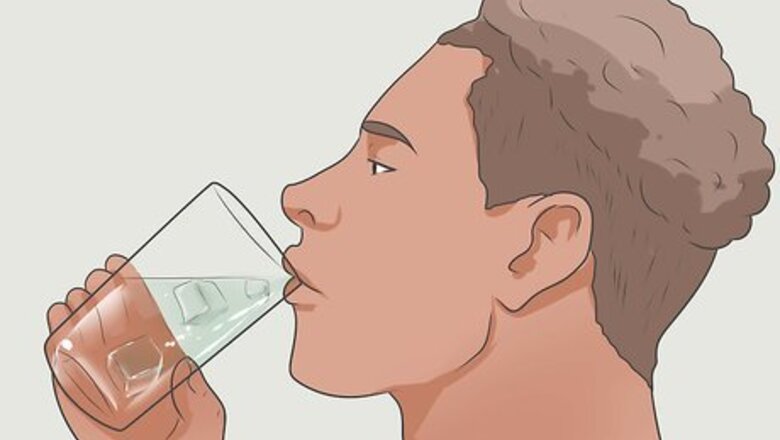
views
Dietary Changes
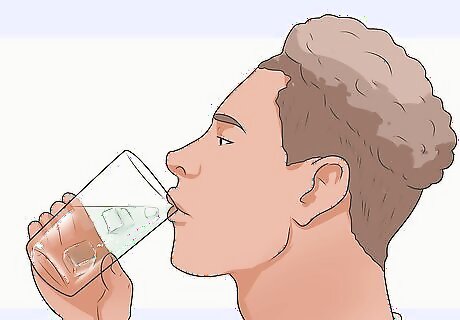
Drink lots of water. Drink at least eight glasses of non-caffeinated fluids a day while you are constipated. Dehydration is a common cause of constipation, and can make it worse if you continue to drink too little water. Once you're back to normal bowel movements — at least once a day, passing them comfortably — you can stop measuring your water intake. Just drink enough fluids that your urine is colorless or pale yellow, and drink throughout the day as you get thirsty.

Increase fiber intake, gradually. Dietary fiber is the most significant component of your diet for encouraging healthy bowel movements. Adults should eat 20–35 grams of fiber each day, but gradually work your way up to this amount to avoid gas and bloating. Try getting your fiber from multiple sources for a healthy diet: Bread and grains: 100% bran cereal (9g per ⅓ cup/80 mL), shredded wheat (3.5g per ½ cup/120 mL), oat bran muffin (3g) Beans: 6–10g per ½ cup/120mL cooked, depending on type Fruits: pears (5.5g with skin), raspberries (4g per ½ cup/120 mL), or prunes (3.8g per ½ cup/120 mL stewed) Vegetables: potatoes or sweet potatoes (3–4g, baked in skin), green peas (4g per ½ cup/120 mL cooked), or green vegetables (3g per ½ cup/120 mL cooked).
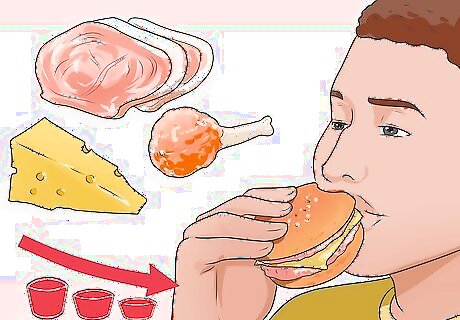
Eat fewer low-fiber foods. Adding fiber to your diet won't help as much if you simply add it to the rest of your diet. Meat, cheese, and processed foods contain little to no fiber, and can lead to dry stools if they make up a large portion of your diet. Eat these in small portions only while you are constipated, and try to replace some of them with fiber foods in your regular diet.
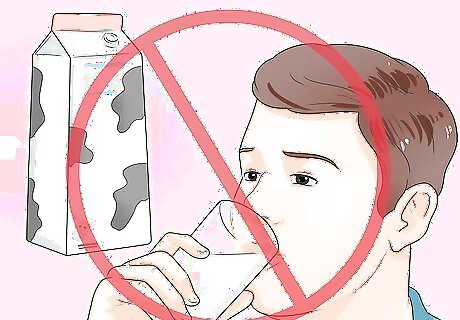
Avoid milk. Try doing without milk and other dairy products for a few days, to see if it helps. Many people have trouble digesting lactose, which can give them gas or constipation. Most lactose intolerant people can still enjoy plain probiotic yogurt and hard cheeses.
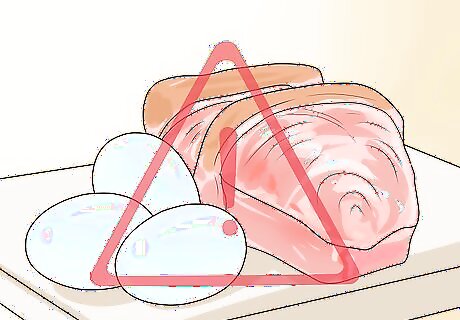
Be aware of foods that may cause constipation. The following foods are usually fine in moderation. If they make up a large portion of your diet, however, they are probably contributing to your constipation: High-fat meats Eggs Rich, sugary desserts Processed foods (typically low in fiber)
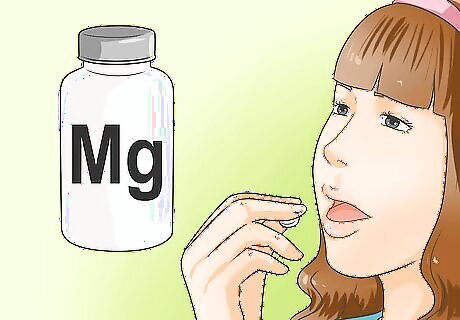
Consider magnesium supplements. Hard evidence supporting this is thin, but many doctors and patients report that magnesium helps. That is because magnesium citrate supplements are thought to be osmotic laxatives, which means these help relax your bowels and bring water into your intestines.Take no more than 350 mg a day in pill form, or 110 mg for children aged four to eight. Bran contains both magnesium and fiber, making it an excellent choice of food. Magnesium may be dangerous for people with kidney disorders.

Be cautious with home remedies. In almost all cases, changes to food and drink are enough to help constipation pass and avoid it in the future. Dietary supplements (besides fiber supplements) and home remedies are rarely necessary, and may be unwise to take without talking to a doctor. The most common home remedies are mineral oil and castor oil. These are effective, but should only be used as a last resort. Overuse can cause vitamin deficiency or damage your intestine, causing further constipation down the road. Do not take these if you are on blood thinners, antibiotics, heart medication, or bone medication.
Lifestyle Changes
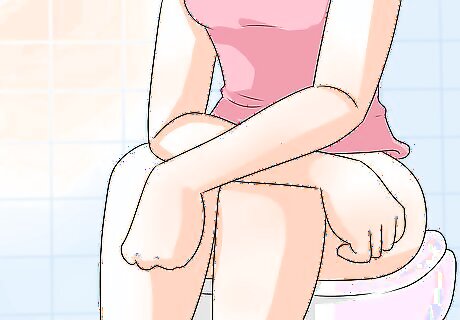
See to your bathroom needs promptly. Visit the toilet as soon as you feel the need for a bowel movement. Delaying the visit worsens constipation.
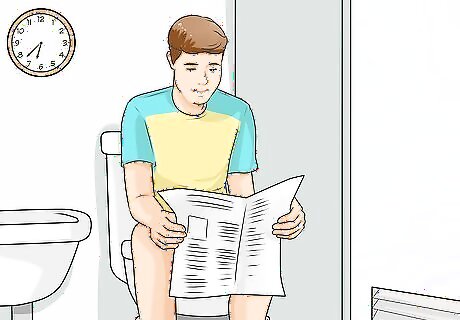
Give yourself time on the toilet. Straining on the toilet can lead to painful complications such as hemorrhoids or anal fissures. Go easy on your digestive system by giving it time to move on its own. Try visiting the toilet 15–45 minutes after breakfast each day. You may not pass a bowel movement daily (even when healthy), but this is a good time to encourage it.
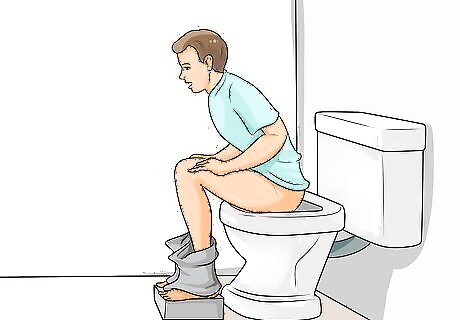
Test a different toilet position. One study shows that squatting makes bowel movements easier and faster. For people who cannot feasibly squat over their toilet, try the following: Lean forward with your hands on your thighs. Put your feet on a step stool to bring your knees above your hips. Instead of straining, take a deep breath with your mouth open. Let your stomach expand, then tighten muscles slightly to hold it in place. Relax your sphincter. Repeat this breathing exercise no more than three times. If there's still no bowel movement, get off the toilet or pick up some reading material.

Exercise regularly. Exercise can stimulate your bowels, even if it's just a 10 minute walk several times a day. Aerobic exercise such as running or swimming is particularly effective. Wait one hour following a big meal before strenuous exercise (enough to increase your heart rate), or you could slow your digestion.

Try stretching or yoga. This is another form of light exercise that can aid digestion. Some people find yoga particularly effective, perhaps because it stretches the abdomen.
Taking Laxatives

Talk to a doctor if you are at risk for complications. It's generally a good idea to talk to a doctor before taking a laxative. People in certain circumstances should always do so, to avoid health complications: Pregnant or breastfeeding women Children 6 years old or younger Adults over the age of 65 Anyone taking other medication. (If you are already taking a laxative or mineral oil, wait for at least 24 hours before switching to a different laxative.) Anyone with severe stomach pain, abdominal cramps, nausea, or vomiting should avoid laxatives entirely, and visit a doctor immediately.

Start with a bulk-forming laxative. Also called fiber supplements, these have the same effect as an increase in dietary fiber. Unlike other laxatives, these are safe to use daily, but may take two to three days to work. They sometimes cause painful bloating and gas, especially during a severe case of constipation or in people who normally have a low-fiber diet. Minimize this risk by drinking 8-10 glasses of water daily, ramping up to the recommended dosage gradually, and avoiding this type of laxative before bed. Some people are allergic to psyllium, found in some bulk-forming laxatives.
Consider rectal suppositories. In some cases, glycerol suppositories can be useful to help relieve short-term constipation. To insert the suppository, unwrap it, face the pointed end toward your rectum, and use a finger to push it as far in as possible. Try to keep as still as possible to hold the suppository in place. If inserted correctly, it should start working in around 20 minutes. Many people moisten the suppository with tap water before inserting it. These suppositories are only intended for short-term relief. If you are still constipated after 3 days of use, see your doctor.
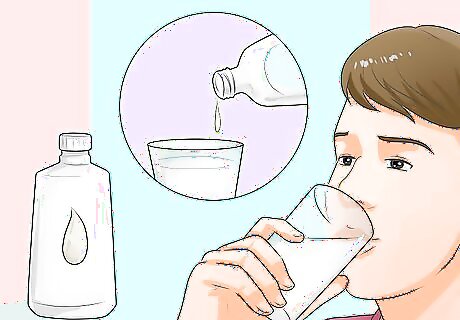
Use lubricant laxatives for quick relief. These cheap laxatives grease your stool with mineral oil or similar substances to ease passage. They typically take effect within 8 hours, but are only suitable for quick relief. Overuse can lead to vitamin deficiency. If you are taking any other medication, talk to a doctor before taking lubricant laxative. The hastened passage of stool can decrease the amount of medication that is absorbed.
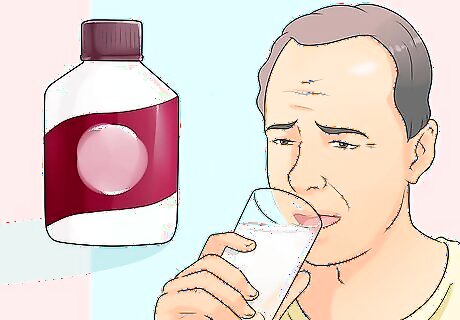
Try osmotic agents for general relief. This type of laxative helps your stool absorb more water and pass more easily, taking effect within two or three days. These require a great deal of water to be effective, and to avoid gas and cramps. The elderly, people with diabetes, and people with heart or kidney issues should be monitored regularly for electrolyte imbalance and dehydration while taking this drug. Saline laxatives are one type of osmotic laxative.
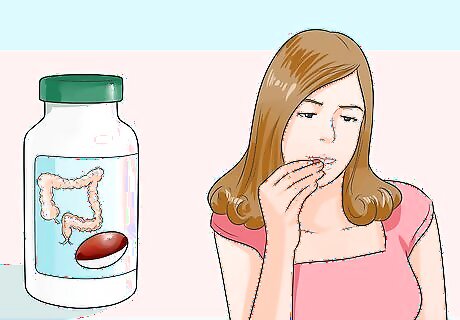
Use stool softeners for short-term issues. Stool softeners (emollients) such as docusate sodium are usually prescribed after childbirth or surgery, or for patients who need to avoid straining. These have a weak effect, but still require plenty of water and should only be used for a few days.
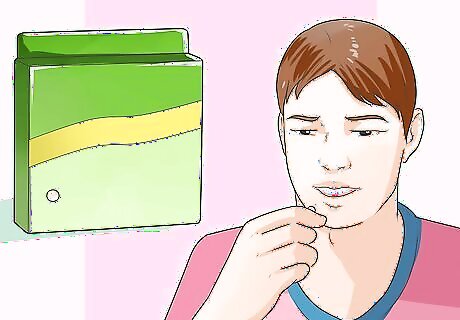
Take a stimulant laxative for severe cases. This is a more powerful laxative that may not be available over-the-counter in all areas. It can provide relief within 6–12 hours by causing muscle contraction in your intestines. This should only be used rarely, as repeated use can damage intestines and make you dependent on the drug for normal bowel movements. Check the label for phenolphthalein, which has been linked to cancer. This type of drug can also cause cramping and diarrhea.
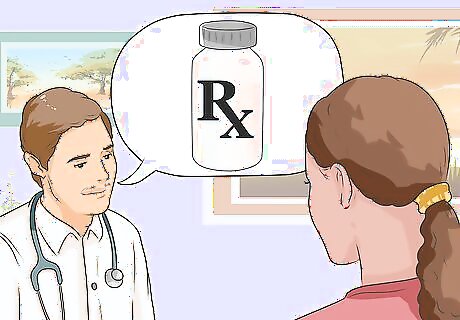
Visit a doctor for prescription medicines. If an over the counter laxative does not work within three days, visit a doctor right away. He may suggest the following treatments or tests: A prescription laxative, such as lubiprostone or linaclotide. These may be suitable for longterm use. Enemas can deliver laxatives directly to the location of the problem, or flush out compacted stool. While available over the counter or as home remedies, they are best used sparingly and while following medical advice. If your doctor suspects a more serious problem, they may ask for a blood test, stool sample, X-rays, bowel examination, enema test, or colonoscopy. They may also suggest manual disimpaction for particularly difficult situations.

















Comments
0 comment